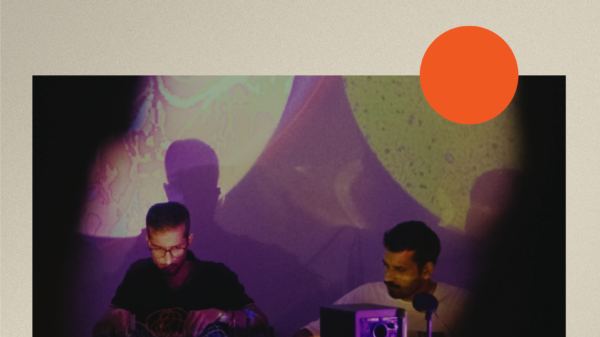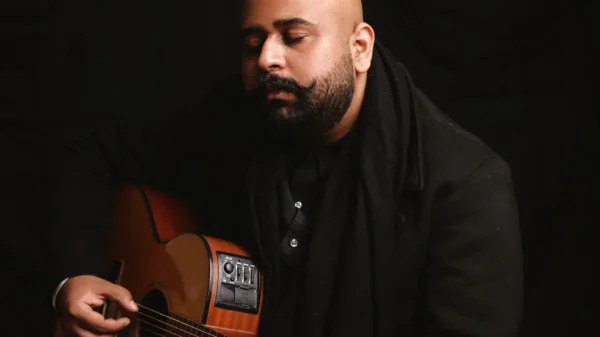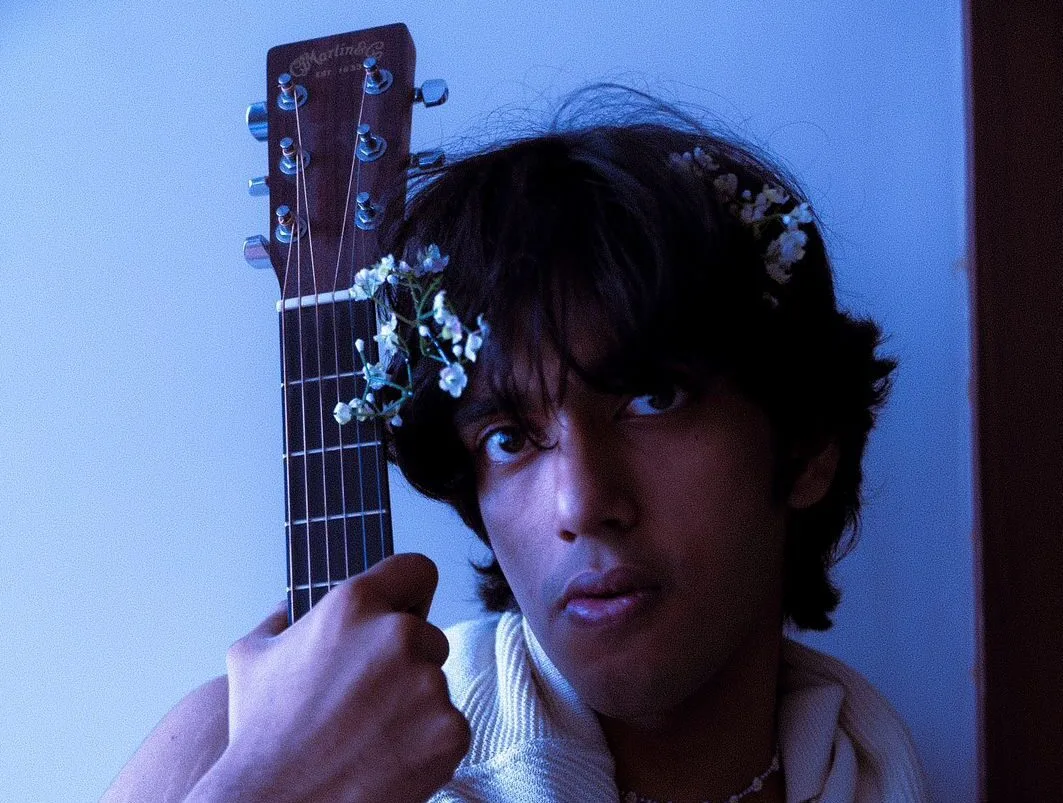Aditya Hulo Is a singer/songwriter and guitarist from Calcutta, now based out of Berlin. Alongside performing, writing, composing, and recording, he has been teaching guitar and music theory since his acceptance into the Berklee College of
Music. He has played gigs in the Netherlands and Germany and has also collaborated with artists like Bickram Ghosh.
Recently, Aditya Hulo was spotlighted on TuneCore’s ‘Next,’ a flagship artist spotlight property by the global music distribution and artist development platform, TuneCore. Built for India, ‘Next’ spotlights independent artists from across the region who are at an inflection point in culture. In conversation with us, he talks to us about his journey so far.
Tell us a bit about your project. How did you begin your journey as a singer/ songwriter?
I initially released music under my own name “aditya” but Aditya happens to be the John of India which means it is not particularly search engine optimised. The only other name that felt as personal as my own name was “Hulo” which is a name my grandma gave to me claiming I sounded like a cat as a baby (Hulo is a colloquial name for cats in Bengali). She consistently, endearingly called me that throughout my life and she was also the person that got me my first guitar so selecting the alias/stage name “Hulo” felt like a full circle. I decided to release my first original “Golden” that I recorded in Berlin for the same album as “Light and Sound” under this new artist profile “Hulo”. Using a name other than my official one allowed me to express my thoughts in a more liberated manner. I have had the privilege to meet incredible musicians and record and perform my songs alongside them!
My journey as a singer/songwriter dates back to the first I remember of my life. I heard some rock and roll on my mom’s iPod and fell in love with the energy and it became the theme of all I wanted to do. I whined and cried for a guitar my grandma got for me when I was 7/8 years old and without learning half a chord, I formed my first band “R-P-G-O”. We covered songs we were totally not ready for and started putting them up on YouTube which my classmates made sure to ridicule and I do not blame them for that. We played a lot of school events and I started writing super plagiarised songs for us too. I have a really supportive family that did not just encourage me to keep doing that, they also pushed me to try and improve and practice more. I then played my first professional gig as a lead guitarist for a Guns n’ Roses tribute band when I was 12, my highschool senior got me that gig because I was the only one that could play the Sweet Child o’ Mine solo and would accept a payment of Rs. 900. That experience changed my life because I witnessed a crowd go wild purely off of our energy, not just the music(we were quite untight)! I then joined a Bengali rock band “Waiting List” consisting of college students when I was 14 as their lead guitarist and co-composer. This gave me a lot of live performance experience because Bengali Indie music had a good crowd before the pandemic. I also had my first studio experience with this band where we recorded our song “Pujo’r Diary” and released it independently. I discovered that the studio opens unlimited avenues with your creativity and music can be just as much fun off a stage too!
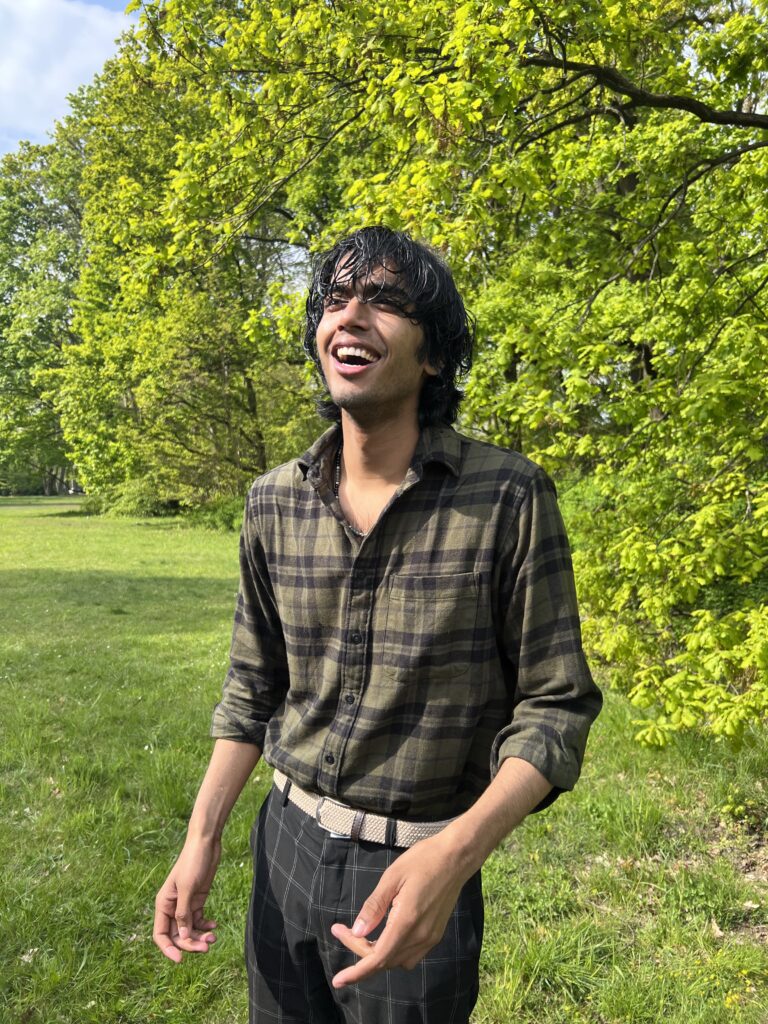
When the pandemic hit, it was very disheartening that the live scene was entirely on a halt but I finally found the courage to sing in front of people after putting out my first cover in 2020! I started writing my own songs more seriously too and filled my notes app up with drafts, I loved the process of getting things wrong too – mistakes were fun and not knowing anything just meant I had all the things to learn. My Family has always been my most consistent and supportive audience – giving the perfect amount of encouragement and feedback. The thirst to learn and grow always kept me going, through the good performances and songs and the bad.
I started performing as soon as there were fewer restrictions with the Lockdown. I also had the privilege to write an anthem for a sustainability and environment focused organisation “Y-East” called “Tell me now”. In this song I had the blessing to record with iconic musicians from across the city – I experienced a more professional recording for the first time and felt as if I belonged. While the end result of the song was not what I wished for, this experience taught me so much and I’ll be eternally grateful for it.
But as these projects concluded, I developed a fear which was only inevitable with growing up. The fear of stability, the sudden change in my gigging life because of the pandemic wounded my yearning for a career in music and I gave into it. This meant forgetting the plan to apply for music college after high school and committing to that life completely. I applied for sociology and economics in my bachelor’s and flew out to the Netherlands to study. Within a week I played a gig there already and was so surprised at how well they paid me and how the audience responded to my originals. Over the next few months I buried myself in academic workload and my parents knew something was off, this is when my parents told me to drop out which was too much for my guilty conscience. However, the university said they’d refund my tuition because they also felt as if my heart wasn’t in the degree. Such a holistic offer convinced me to grab this opportunity by its horns and do what the only thing I know, write and perform. My parents and teachers fully supported me through this and I carried a lot of guilt with me when I came back but my grandfather told me to stop whining and write about it.
I then wrote and released my first two EPs “damage control” and “Silvertown” under my then alias “aditya”. This was my first time working entirely independently and while it was a lot of fun, there was a lot left to learn which a couple of rough mixes and poor takes proved to me months after releasing the songs… I wanted to take them down but my parents and friends insisted I let them stay because they liked the songs. I decided I will study music and applied to a bunch of schools across the world. I got into the Berklee College of Music which was a distant dream of mine since I was little but the tuition fee despite a generous scholarship still felt like too much. I decided to go study songwriting at BIMM Institute Berlin instead. This is where I met some amazing musicians at Uni and decided to start playing my songs with them. We played a bunch of gigs at iconic Berlin venues like Privatclub, Lido and even a SoFar Sounds gig. We sold out our first feature event which was a fundraiser I hosted for Chhaya Animal Shelter, an organisation I donated to with my gigs in Kolkata! These experiences encouraged me to record my album that was ready in my voice memos and by August I had my album ready!
I now have 3 more albums ready to record as soon as I gather the funds and find the time outside my gigging schedule. I am also creating a marketing and social media plan for the upcoming album but my father claims I am not half as natural at marketing and media as compared to music – he is seldom wrong. I am super excited for everything the future holds and all there is to learn!
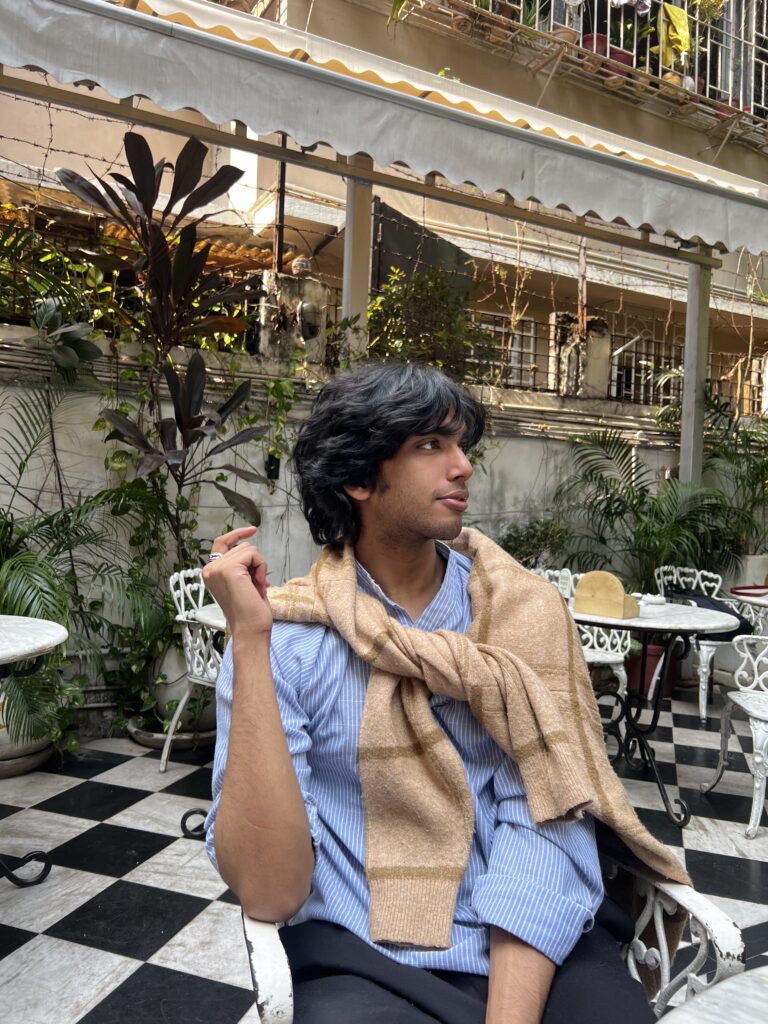
Which bands/ artists were your first love and who is your biggest influence?
The first artist that made me fall in love with music was Jon Bon Jovi and his band Bon Jovi, I heard their album “Slippery When Wet” on my mom’s iPod Shuffle when I was about 3 or 4 years old. All I did was play this album on repeat and beg for their merchandise – this eventually led to me asking(crying) for my first guitar. Around the time I was 7 I discovered Coldplay’s first studio album “Parachutes” and never realised that album would change my life, I started thinking of music differently – both sonically and aesthetically. In recent times, Hozier has moved me a lot – I love his lyricism and I think he has such a beautiful voice.
A lot of guitar players also moved me a lot… Legends like Jeff Beck, Larry Carlton, John McLaughlin, Jimmy Page and many others changed the way I listened to music – and I read further about their influences which brought me to some Jazz records like Chick Corea’s “Crystal Silence” and a lot of Gospel Music changed how I approached concepts like harmony. Despite all that I do like sticking to my four chords every now and then but knowing why they work just helps navigate me through the writing process.
Sufjan Stevens and Tamino are two artists I discovered very recently and they’re always playing on repeat on my headphones lately. I am a huge admirer of The Lumineers for their storytelling ability, it is something I really wish to do more of.
Joni Mitchell and Don McLean are two artists my father introduced me to and it didn’t take more than one verse and a chorus to start worshipping them.
It is so difficult to find my biggest influence but as a singer-songwriter I have been the most moved by Coldplay and Hozier. As much as I love storytelling, I love performing and they really inspire me.
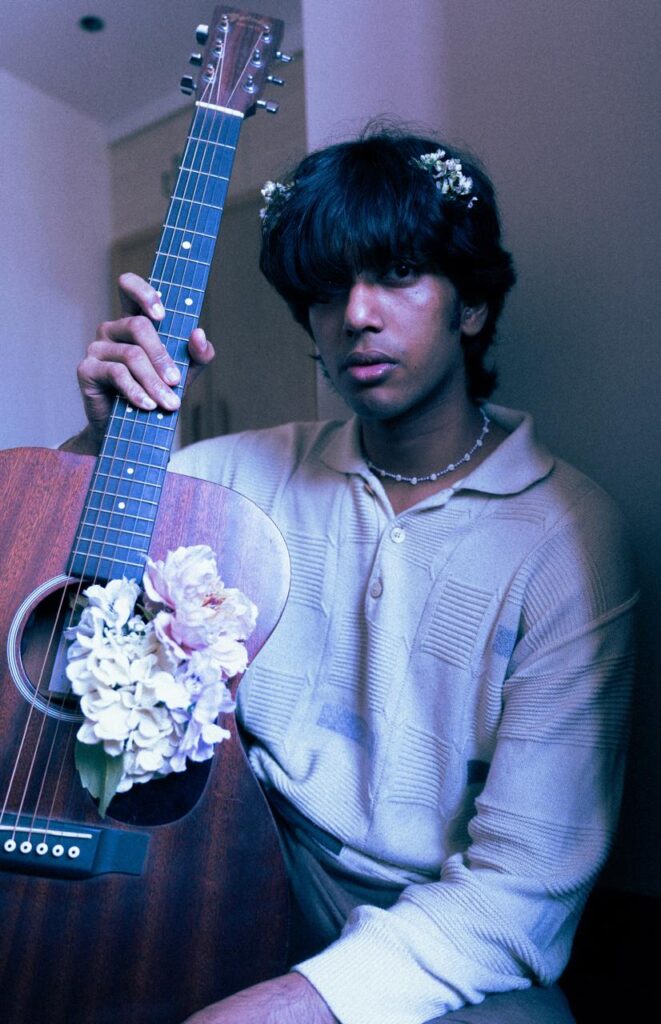
Tell us a little about your latest release, ‘Light and Sound’.
My latest single “Light and Sound” is a part of my upcoming album “Griefcase” which is mostly a collection of stories talking about mental health, through both a personal and societal lens. This particular single was inspired by my friend in Berlin who I met in my first few days there. She told me about how she was born deaf, and how through medical procedures she regained her hearing at the age of 5 but until then all she had was her vision, until she discovered sound and automatically fell in love with music. She now plays the classical piano and speaks around 10 languages and she says she’d never devote her life to this without being that grateful for these sensations. This really inspired me to pay a tribute to these two gifts, and write about how grateful I am to have the privilege to enjoy both light and sound.
Sonically, I got my hands on a few guitar effect pedals and my friend’s Telecaster and while playing around with these really cool things I wrote the riff for “Light and Sound”. I immediately knew I had to hear it with a band so I took the song to my classmates at Music School in Berlin and wrote out the chord charts for them – within an hour I had a complete arrangement. A couple of months later, I decided to record this song along with the rest of the album in Berlin itself. I had my friends Pedro Necho and Alban Konig co-produce this album with me and my friend Vignir Vidarsson sat and arranged some of the songs with me and played Bass on the record. By the end of May “Light and Sound” was recorded, and later mixed by Alban.
Now, I’m back in India and this song has become a regular in my live sets that I play with my band here(Henry Gomes on the Bass, Akash Sarkar on the keys, Anchit Sengupta on the guitar with me, Arpan Chatterjee on the drums and Rachel Shah on Backing Vocals).
What is your music-making and recording process like?
In my day-to-day life I engage in a lot of note-taking. I love stories and I think even if something is pure fiction, it has been influenced by memories so I meticulously take notes but they’re very messy. That’s usually the foundation of my song – whether it gives direction to my sound, aesthetic or lyrics is subject to change. I love hearing people talk but I often give them a disclaimer that I may take notes which is more often than not, seemingly weird which is why I believe I do not have at least 15 albums out already. But I make do with the stories I am allowed to write and songwriting is my preferred way of story-telling. I usually get one melody line and I see the kind of lyrics I can fit and then try and write all the lyrics and adapt the melody to it bearing in mind the kind of harmony I want to back it with. Harmony for me is very expressive and can change the entire context of a lyric but I normally have a vision on the harmonic nature of a song within the first few seconds of writing it. Every song starts with my guitar and I, and the choice of the guitar often sets the path for the song : if I use a nylon string, the song is likely to be more melancholic, if it’s a strat it’ll probably be groovier.
Then comes the arrangement process in which I try to further explore how the instrumentation and structure can elaborate on the context. While arranging a song I’m always thinking about how much of it I can do live because live performance is just as much fun as making a song for me – nothing feels like a crowd smiling and having a good time. Before taking a song into the studio I sit with a live arrangement of the said song and we subtract or add elements there, courtesy my terrible handwriting – my music is directed by my notes app. Then I pick some session musicians based on the vibe, they’re usually my friends too and I write their parts down in sheet music or give them an idea of the vibe I’m going for. I play some of the guitars myself and we usually do live recordings for bass and drums together where I’m giving a guide vocal and guitar, this has been the standard of procedure for this album and it’s gone really smoothly. Right after that we lay keys and other atmospheric elements and then finally I record vocals where my main intention is to express rather than to impress, which may also be an excuse for needing countless takes before finding peace. We often record other sounds after this to see if they help add something to the song and we also often strip elements down after the vocals are final.
The mix and the master is what I’m the furthest from because by then I am usually already oversaturated. So I yet again give a very vague sense of direction to the engineer and I have been lucky with my last 2 songs where I have been very happy about the mixes.
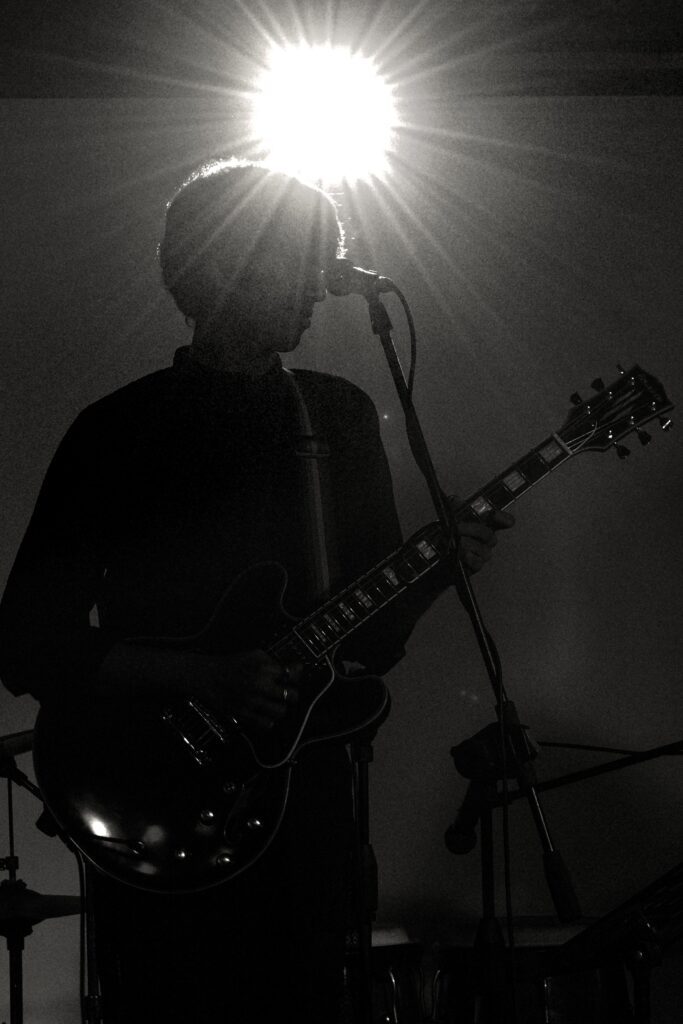
Tell us a bit about your upcoming album “Griefcase”
My upcoming debut album “Griefcase” is an 8-track studio album that I wrote over the course of about a year(October 2022 – January 2024) and recorded between May and August in Berlin at Tricone Studios. This album comprises stories that help narrate issues surrounding mental health and themes like heartbreak, global conflict and gratitude. While writing each of these songs I knew they belonged in the same album. Sonically, this album used recording and mic-ing methods popularised by artists like Radiohead, Coldplay, Jeff Buckley and some bizarre ideas the recording crew and I came up with ourselves. We recorded 4 songs in one day where we did live drum and bass takes with a guide guitar and vocals, followed that up with keys and guitar overdubs. We then layed down vocals(lead+backing) and added extra layers. The studio had its own grand piano and a fascinating arsenal of microphones(U-47, SOYUZ etc.), guitars(Fender ’57 Strat, Gibson ’64 ES-335 and more), amps(Fender ’65 Deluxe Reverb, Mesa Boogie Dual Rectifier and more) and a Hammond! This meant that we spent a solid hour nerding over the amazing gear which the studio was kind enough not to bill. We then finished the remaining 4 songs over the next month between this studio, my friend Alban’s home studio and also recorded the Fender Rhodes at Jazz Institute Berlin. The mixing and mastering for all tracks was completed by the end of August and I released golden on the 3rd of August followed by Light and Sound on 30th November.
I intend to release a few more singles for a waterfall style release of the album!
Why do you make music? What drives you as a musician and what are your songs about?
I think initially I started making music because I was a quiet child and I always had a lot to say but struggled to speak up, but I could always sing my heart and mind out. I wrote gibberish songs as a child too and my family was always supportive and they listened to it all. That eventually put me in a place where today, making music or performing is all I can do – sure I did a bit of economics in school but that was mostly because I had to. I love stories, whether I am the one telling them or listening to them – stories move me because people fascinate me and each person is a part of countless stories everyday. I think the social aspect of human nature is too special not to sing about. Whether it’s love, heartbreak, family, pain, school, a beer etc. it’s all so deep because there is so much pathos behind it all, at least for me. This constant yearning for narratives drives me to write. I also love playing the guitar so that is only a plus, a dramatic majority of my songs are guitar centric.
My songs are usually about personal experiences that could be interpreted on a societal degree too. I write a lot about heartbreak and pain because I think the best thing to do with negativity is to create art you can smile at. I seldom write about happier themes because I am too busy enjoying those experiences in the flesh. I also enjoy composing atmospheric instrumentations because that is mostly what I listen to.
Which Indian bands or artists do you admire and why?
I am a huge fan of Parvaaz – I dig their sound and they’re all such incredible musicians too. Zakir Hussain is a rockstar, I love how he can collaborate with anyone and express such fine thought and musicianship.
I recently witnessed Peter Cat Recording Co. live and fell in love. They have such a unique aesthetic and I admire how they sign their signature upon anything they do whether it’s their social media, stage performance, lights or their lyrics.
In my time in Berlin, I ran into Ditty in the U-Bahn(German Metro) and we had a conversation noticing each other’s guitars – then later I went home and listened to her music and was mesmerized by her lyricism and songwriting. I really enjoy some more folksy-sounding musicians like Prateek Kuhad, Raghav Meattle and the Bangla duo Taalpatar Shepai and I admire their storytelling abilities.
Being a boy from Calcutta, I have a soft spot for Parekh and Singh, they’re so much fun! The Yellow Diary and When Chai Met Toast are so, so good live!
What’s your take on the independent music scene in India?
The first thing I think of when I read the word independence is freedom which conveys two very distinct things, creative liberty and dauntingness.
The independent music scene in India is very, very daunting to me, we have a lot more resources as artists today but there is also an abundance of creativity and information in India. Guiding oneself through this is potentially very overbearing. In my very brief experience in being an independent artist and also curating several others at gigs I host has helped me discover that we all operate with a perpetual anxiety, a fear of being lost in this abundance. When there are so many lanes and roads, it’s easy to get lost and I feel like the independent music artists could use some guidance and help to navigate themselves through this maze.
While I dig creative liberty, I also want to be noticed and heard – nothing lifts me up like the sound of a full venue or the audience singing my song back to me. I must take feedback from the most important people in my life, my family, friends and most importantly my audience because despite writing the songs myself, I am writing them to sing them to the world. I do hope there are more platforms for artists to perform so they can feel that energy of strangers enjoying their art. As important as it is to write for me, it is to entertain and I constantly wait for my next show – putting together an elaborate set with my band both musically and aesthetically where each show is a masterclass where I am the student and the audience are the teachers.
I do feel like there are great things coming up like independent music blogs, playlists and music distributors that actually care about their artists. I think the artists must always be open to taking any sort of help they can get because everything goes such a long way. I really want to thank both TuneCore and TIMD for including me in this series and actually, just for this initiative in general. From the moment I got the Email, I’ve been excited to a newfound extent, and I am very, very grateful for this 🙂







